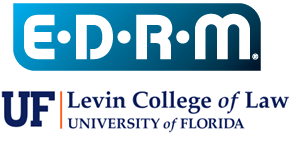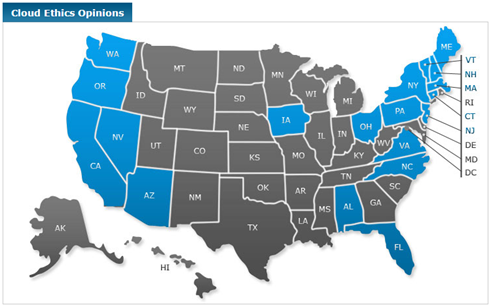Craig Ball of Craig D. Ball, P.C.: eDiscovery Trends

This is the fifth of the 2016 LegalTech New York (LTNY) Thought Leader Interview series. eDiscovery Daily interviewed several thought leaders at LTNY this year to get their observations regarding trends at the show and generally within the eDiscovery industry. Unlike previous years, some of the questions posed to each thought leader were tailored to their position in the industry, so we have dispensed with the standard questions we normally ask all thought leaders.
Today’s thought leader is Craig Ball. A frequent court appointed special master in electronic evidence, Craig is a prolific contributor to continuing legal and professional education programs in the United States and abroad, having delivered over 1,700 presentations and papers. Craig’s articles on forensic technology and electronic discovery frequently appear in the national media and he teaches E-Discovery and Digital Evidence at the University of Texas School of Law. He currently blogs on eDiscovery topics at ballinyourcourt.com.
What are your general observations emerging eDiscovery trends for 2016?
{Interviewed Craig after LTNY, as he did not make it to the show this year}
I skipped LegalTech this year – first time in twenty years – because Mardi Gras was early this year, I chose the circus on the Mississippi over the one on the Hudson. Still, I got lots of feedback from those who attended LTNY while I was catching beads at 29 parades. I wanted to see if I’d missed anything of note. The only trend that emerged was lack of change in the focus of the show. LTNY is still dominated by electronic discovery as it has been for almost a decade; but, there are continued signs of consolidation within the industry as organizations fold into one another.
Not surprisingly, we don’t see outright failure in this space. Companies don’t disappear, but instead reach a point where whatever is left is absorbed by a national brand for its equipment or core technology. So, we’ve seen steady consolidation within the industry, and that trend continues. As the broader economy goes, so goes litigation and discovery.
Another trend that I’ve observed is an increased focus on eDiscovery automation and considerable growth of, and investment in, eDiscovery automation providers. What are your thoughts about that trend?
The term “automation” has gotten some play lately. I’m trying to figure out what each usage means because it’s still in the buzzword phase as marketers deploy the term in the never-ending struggle to differentiate their products. Automated workflows are key to Cloud SaaS offerings. Hosted systems must be capable of programmatic routines to ingest and process data, effecting ready hand-off of data across processing and review. An automated SaaS offering should be sufficiently autonomous to facilitate workflow across multiple stages of the EDRM with little manual intervention.
Assuming “automation” means we can put something into the hopper and it will emerge ready for review or production in forms we were expecting, then automation is a necessary precursor to growth and cost effectiveness in hosted products. That’s positive for consumers if it means price reductions and commoditization of features of electronic discovery. It may not be so great for the vendor community unless they can scale up the volume.
In the case Nuvasive v. Madsen Medical, the Court recently vacated an adverse inference instruction sanction previously applied against the plaintiff because of the amendment to Rule 37(e). Do you see that as a trend for other cases and do you expect that other parties that have been sanctioned will file motions to have their sanctions re-considered?
I don’t think it signals a trend. There are relatively few cases that fall into the transition point. I don’t expect to see a rash of sanctions being reconsidered by virtue of the latest amendments.
Nuvasive is interesting because it goes to the issue of whether it’s fundamentally fair to impose the new Rules retroactively. The Rules speak to that issue and make it clear that they can be applied retroactively as long as they operate fairly. The amendments to the Rules make clear that serious sanctions (such as adverse inference instructions) require proof of an intent to deprive a discovering party of the particular information. Nuvasive involved serious sanctions, so I can see why the Court might want to weigh amended Rule 37(e). Still, I’m not sure why the parties and the Court failed to anticipate the Rule changes, as the amendment process was pretty far along in July 2015, when sanctions were imposed. The tenor of the Court’s opinion in reversing himself was that it was just ‘bad luck’ that the amended rules kicked in when they did.
I think that we will see judicial action once termed “sanctions” couched in less-loaded terms. After Rule 37(e), Courts will distinguish punitive responses from remedial actions designed to rectify unwarranted failure to preserve relevant information. New Rule 37(e) won’t tie the hands of jurists determined to rectify discovery abuse. We’re already seeing push back from jurists unwilling to surrender discretionary authority when the facts demand fairness. As well, we’ve seen at least one case where the Court reversed himself, citing 37(e) as the basis for reconsideration. As is apparent in Nuvasive and in Judge Francis’ recent order in Cat 3, the Rules are tools, and they can be turned this way and that in determined hands.
Sanctions aren’t going away, and that’s a good thing. We are mired in the last century when it comes to discovery. Lawyers need direction, and sanctions opinions supply guidance. There is little in the way of a “carrot” for eDiscovery – all we have is the “stick.” If courts fail to sanction incompetence and abuse, then lawyers won’t pursue competence, and parties will continue to “twiddle their thumbs” until evidence disappears. Few lawyers maliciously hide damaging evidence; but, they’re expert at rationalizing it away or, in the case of e-discovery, content to let their ignorance serve as their armor. “What you don’t know, can’t hurt me,” is their credo.
What are you working on that you’d like our readers to know about?
I’m going back to basics. Last year was about trying to develop a core curriculum and re-engineer my teaching to make it an engaging foundation in information technology for lawyers. I hope 2016 will bring an increased ability to push out more information and reach more people. I’m doing a project for the DC Bar where I will be providing evening CLE programs by live semi-weekly webcasts. Small groups of motivated people are my sweet spot. As always, I’m looking forward to this year’s Georgetown University Law School eDiscovery Training Academy, during the first full week in June. Both the faculty and the students are delightful. I’ve come to recognize that anyone willing to work at it can learn the technology they need to be formidable in e-discovery in just three solid days. That’s less time than most of us spend at Starbucks each year.
I’m using the California ethics decision (which we covered here when it was still a Proposed Opinion) as a jumping off point for the concept of core competencies for lawyers. As you know, the State Bar of California issued an advisory opinion last year identifying nine areas in which lawyers must either be competent in order to accept a case involving eDiscovery or must associate competent counsel or decline representation. That courageous opinion serves as an effective touchstone for talking to lawyers– not just in California, but all over– about the skills they must embrace to be competent to accept a case involving eDiscovery.
There are virtually no cases without electronic evidence, only cases where the lawyers choose to ignore it. And there is so much more coming! Never in history have advocates had so much powerful evidence at their disposal, and never have they been so content to look away. Three days per advocate could change all that—a long weekend. But, finding the time is only half the battle. The other half is finding the course that doesn’t give short shrift to the “e” in e-discovery.
Candidly, 2016 is also about taking some time for me. I’ve been doing 50 to 70 presentations a year for twenty years. I average about four flights a week; so, I’m hoping to cut all that down by half. I’m saying “no” more and stopping to smell the roses. That’s why I’ve gotten a second home in New Orleans, and will spend more time reading, thinking and working on fewer projects with greater focus. Every teacher needs a sabbatical, right?
Thanks, Craig, for participating in the interview!
And to the readers, as always, please share any comments you might have or if you’d like to know more about a particular topic!
Disclaimer: The views represented herein are exclusively the views of the author, and do not necessarily represent the views held by CloudNine. eDiscovery Daily is made available by CloudNine solely for educational purposes to provide general information about general eDiscovery principles and not to provide specific legal advice applicable to any particular circumstance. eDiscoveryDaily should not be used as a substitute for competent legal advice from a lawyer you have retained and who has agreed to represent you.








